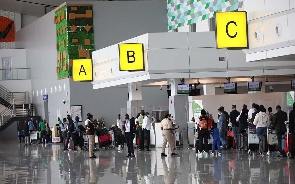Japa, a Yoruba word meaning “to run or escape,” has become a popular slang among Nigerians who are trying to or have already successfully departed their country in search of better opportunities abroad.
A large portion of the country’s middle class has left due to Nigeria’s economic slump over the last decade. The Nigerian Association of Resident Doctors recently revealed there are only approximately 10,000 resident doctors left in the nation. And roughly 100 of them depart the country every month.
According to a Cigna survey, younger individuals are now more eager to start an ex-pat life than older ones. 37% of those between the ages of 18 and 24 and 34% of those between the ages of 25 and 34 are willing to leave.
In comparison, only 13% of individuals over 50 who participated in the study expressed interest in relocating to a foreign nation.
Meanwhile, the Chief of the International Monetary Fund (IMF), kristalina Georgieva, recently warned that 2023 will be a difficult year for the global economy, as top economies like the US, Europe, and China will all see declining growth. She emphasised that 2023 will be “tougher than the year we leave behind.”
The projected tough global economic realities in 2023 will make it more difficult for the Nigerian middle class to emigrate. That’s because relocating abroad can be quite expensive, especially for those trying to emigrate through the academic route which is the most used route by Nigerians.
Given the tough economic difficulties across Europe and elsewhere, many Nigerian students are already experiencing escalating food insecurity. In November 2022, the UK’s National Union of Students (NUS) released its Cost-of-Living Research which showed that over a fifth of the 4,500 UK students surveyed had less than £50 after paying their rent and bills.
90% of students polled claimed that their mental health has been harmed by the growing cost of living in the country. Students also admitted that they were concerned about their ability to pay bills, feed their families, and eat.
The United States is not spared in the cost of living crisis. The typical annual cost of living for students in the US is between $10,000 and $18,000.
The biggest expense for Nigerian students abroad, besides their tuition, is rent. Rent makes up around 45% of a typical student’s monthly living expenses. According to the National Union of Students (NUS) and Unipol’s 2021/22 Accommodation Costs Survey, the average yearly rent in the UK for purpose-built student accommodations (PBSA) is £7,374. This represents a 16% rise since the last poll in 2018–19.
With annual living expenses ranging from $14,290 to $19,288 for international students, Australia is regarded as one of the most expensive countries for foreign students.
Universities in the United States and Australia have the highest annual tuition rates, ranging from $32,000 to $60,000, while Ireland is close behind with annual tuition rates as high as $45,000. For undergraduate and graduate courses, tuition fees for international students in the UK range from $14,100 to $38,000.
But this is not to say that all foreign countries are expensive to study. International students can live comfortably in Russia and Argentina for $2,500 to $4,000 a year.
In the same vein, India is one of the most affordable countries to study abroad, with annual living costs ranging between $3,200 and $4,000.
For those who can still afford to travel out through the academic route, one piece of advice for you is to start saving now so you can at least afford some necessities.
Use the internet to conduct proper research on the cost of living in the country you have chosen to study in, so you can be sure whether you can afford it. Specifically, carry out thorough searches on real estate. Housing is perhaps the toughest challenge any Nigerian student abroad can ever face.
If you’re lucky enough to land a job, your earnings might be enough to cover most of the expenditures associated with moving abroad. Unexpected events can be covered with emergency money. Consider what an emergency might be for you while creating a budget for your emergency fund. Cover part of the costs associated with theft or medical care if you selected a high-deductible insurance plan. If seeing your family again is vital to you, set aside money so you may purchase a plane ticket at any moment.
Finally, be aware that currency rates can suddenly alter. You could have to spend less money in your destination country as a result of the shift. You’ll be able to handle changes in currency rates with a little more cash.
Diaspora News of Wednesday, 4 January 2023
Source: www.nairametrics.com













